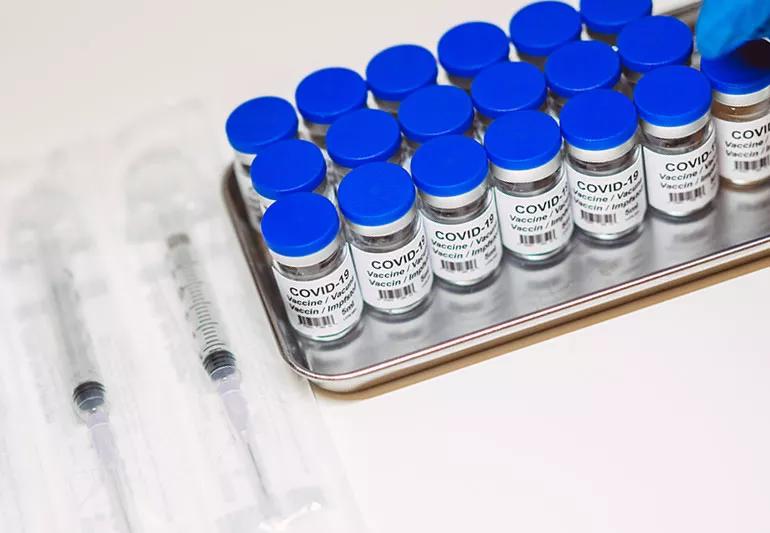There's still a long way to go, though

Image content: This image is available to view online.
View image online (https://assets.clevelandclinic.org/transform/99f33808-72e1-4cf9-850b-495a2e80474a/covidVaccinePromise-1249961272-770x533-1_jpg)
covid vaccine and needles
As the ongoing coronavirus (COVID-19) pandemic continues to unfold across the globe, researchers are continuing to work diligently toward a working vaccine. Several possible vaccines have entered large clinical trials and one in particular has shown promise, according to a Cleveland Clinic expert.
Advertisement
Cleveland Clinic is a non-profit academic medical center. Advertising on our site helps support our mission. We do not endorse non-Cleveland Clinic products or services. Policy
Pulmonologist Daniel Culver, DO, recently spoke about a novel RNA-based vaccine that showed promise. Even though Dr. Culver wasn’t involved in the research, he says that the Phase 1 trial, conducted at the Kaiser Permanente Washington Health Research Institute in Seattle and at the Emory University School of Medicine in Atlanta, showed promise.
“It’s showing that patients respond, that patients are responding in the way you would hope,” he says. The trial looked involved 45 adults, between the ages of 18 and 55, and included two separate doses administered 28 days apart.
Data from the study showed that the potential vaccine triggered an immune system response in patients, producing antibodies that could possibly fight off COVID-19. According to the National Institute of Health, the vaccine is called mRNA-1273 and uses what’s called “messenger RNA” to cause the immune system to generate antibodies that can fight the “spike” protein that the coronavirus uses to attach itself to human cells.
While the patients tolerated potential vaccine well, there are signs that it could cause some mild side effects, including fatigue, headache, chills, muscle pain and injection site pain.
Even with these early successful results, Dr. Culver points out that there’s a long way to go, including multiple additional phases of testing before potential approval for widespread distribution.
Advertisement
“The next steps are to prove that this actually is durable, effective at preventing infection and will be a useful strategy for populations,” he says.
On July 27, 2020, the National Institute of Allergy and Infectious Diseases announced that the vaccine was entering Phase 3 of testing. This new phase of testing will involve 30,000 adults and be a blind, placebo-controlled study. If this phase of testing proves successful, it could pave the way for the vaccine to go to market.
Dr. Anthony Fauci, director of the National Institute of Allergy and Infectious Diseases, also seems cautiously optimistic for the vaccine’s development, saying, “Results from early-stage clinical testing indicate the investigational mRNA-1273 vaccine is safe and immunogenic, supporting the initiation of a Phase 3 clinical trial. This scientifically rigorous, randomized, placebo-controlled trial is designed to determine if the vaccine can prevent COVID-19 and for how long such protection may last.”
Advertisement

Delivered every Tuesday!
Sign up for our Health Essentials emails for expert guidance on nutrition, fitness, sleep, skin care and more
It's a letter about the news!

Every two weeks once
Sign up for our Health Essentials emails for expert guidance on nutrition, fitness, sleep, skin care and more.
Learn more about our editorial process.
Advertisement
The latest vaccine offers the most up-to-date protection
Irregularities in cycle length and flow aren’t a cause for concern
Before you panic, here are the options to consider
You might be protected, but you still need to be careful
Get the facts before assuming the worst
It's not scary and it's another tool that can help us fight the coronavirus
An expert gives insight on what to do if you miss that second appointment
The short answer from a primary care specialist
Type 2 diabetes isn’t inevitable with these dietary changes
Applying a hot or cold compress can help with pain
Pump up your iron intake with foods like tuna, tofu and turkey